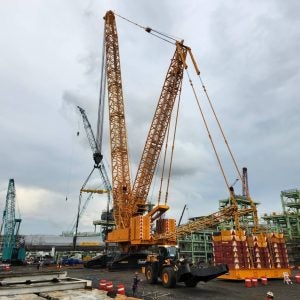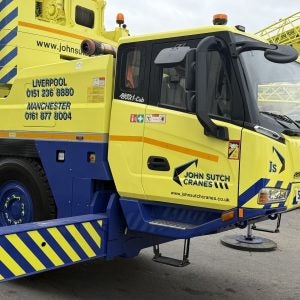THE COLLAPSE of UK rental company Baldwins Industrial Services, reported last month, has prompted a strong attack on the company by a man with a special insight. David Phillips sold his company, Phillips Crane & Rigging of Houston, USA, to Baldwins for $12.5m in September 1999. Three years later it was the failure of this American adventure that brought down the whole Baldwins group.
Initially David Phillips stayed with the company but soon became disillusioned. Now, speaking exclusively to Cranes Today, he has expressed his feelings in a full and frank statement ‘Baldwins failed miserably in all of the criteria that would be required for them to be successful,’ he says. ‘Richard Baldwin is an arrogant, although mostly likable man who shoots from the hip, making important decisions with little planning or research. He trusts the wrong people, relying on those who approach him with a sales pitch, and places much responsibility on them too quickly, rather than selecting good, ethical people, and grooming them for responsibilities for which they are suited.’
Phillips, now aged 54, said: ‘Selling my company to Baldwins was primarily an issue of financial opportunity for me, a chance to get out of debt, and cash out the substantial equity that I didn’t feel would pay as well in the foreseeable future as Baldwins would pay now.
‘My company was profitable through almost all of its 30-year history including recent years (I started it at age 20), and we had a very close family of employees that was a pleasure to work with.’
Phillips said that he felt it was important that he spoke out, but there were aspects he was not prepared to reveal. ‘Unfortunately the saga of Baldwins’ adventure here is more suited to the National Enquirer than Cranes Today. They are highly unethical in their dealings with employees, customers, vendors, and government. They also have made many poor strategic choices, opening branches before the organisation was ready, and purchasing equipment not suited to this market. With an incredibly authoritarian management style, they paid premium wages to attract and keep employees in a market where crane owners normally know and take a personal interest in their workers. Not the recipe for efficiency and company loyalty. Baldwins’ errors have been surprising, even shocking to me. We assumed that a company that had grown so fast would have impressive capacity to make good choices, and organise its operations well.
‘To do what Baldwins tried to do demanded that they do a number of things quite well:
1. Understand the strengths and weaknesses of the competition – it is easy to under-estimate the companies already entrenched in the market.
2. Make decisions by focusing on the conditions in the new environment, not by automatically doing the same thing that worked well at home.
3. Build a team of the best employees whose individual needs are met. Their priorities must be understood by the company. Emphasise leadership, minimise discipline.
4. Provide services at the peak of efficiency. With the cost of labour in the USA, productivity issues are critical.
5. Adopt an American management style, suited to the culture of the branch location, getting people involved in the work, showing appreciation, rewarding excellence, giving back to the community. Workers are your peers, not your subjects.
‘Baldwins failed miserably in all of the criteria that would be required for them to be successful.’
Phillips said that the US managers lacked decision making authority. ‘Everything required permission from the UK. You begin to see the chaos that one could expect. The best people pull back, deciding to be responsible only for themselves, and losing the team spirit they once had. I call this reducing a company to its lowest common denominator. No momentum. No initiative.’
Cranes Today tried to contact Richard Baldwin for a response. His telephone number is not listed. We are happy to offer him the right of reply.






